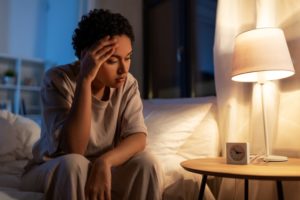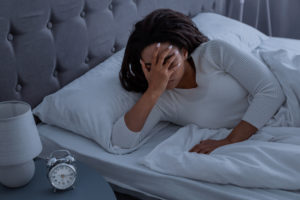When you buy through our links, we may earn a commission. Products or services may be offered by an affiliated entity. Learn more.
Sleepless Nights: How to Function on No Sleep
Sleepless nights might occur for a variety of reasons. Some people are more likely to experience sleep disturbances than others, such as military members, parents of infants, shift workers, and people with insomnia. Although there isn’t clear data outlining how many people have gone a full night without sleep before, at least one-third of people experience insomnia.
Because sleep deprivation can cause many negative effects, even a single sleepless night could greatly affect you. Drowsiness after sleep deprivation can put you at risk for accidents, impair your physical performance, and hurt your memory, even increasing the likelihood of developing false memories. If you occasionally experience a sleepless night due to insomnia or an external cause, there are certain actions you can take to help you remain alert enough to get through the next day.
Looking to improve your sleep? Try upgrading your mattress.
Eat Healthy Meals
Even one night of sleep deprivation affects how you view and select which foods to eat. Sleep deprivation impacts our brains in a way that prompts us to feel more rewarded by less healthy food and engage in higher calorie consumption, which is likely why insomnia and obesity are linked.
Although sugary foods might give an initial energy boost, they can lead to lower energy in the hours to come. Certain healthy foods have been demonstrated to help reduce the severity of chronic fatigue, however. These include whole grains, vegetables, fruits, and foods high in omega 3 fatty acids, such as fish, seafood, nuts, and seeds.
Foods that are high in tyrosine can boost cognitive ability, which could be useful if you have to work or attend school after a sleepless night. Foods high in tyrosine include eggs, meat, tofu, milk, and whole grains.
Strategically Use Caffeine
Although caffeine is not a substitute for adequate sleep, it can provide an energy boost when you need one. Ingesting caffeine can potentially improve physical performance and enhance cognitive ability. Researchers specifically name caffeine as a tool to help workers who have been sleep-deprived, such as military members, first responders, and shift workers.
Although caffeine is considered an acceptable part of a healthy diet, there are risks to having too much. Up to 400 milligrams of caffeine per day— the amount found in about four or five cups of coffee — is considered safe for most people. Keep in mind your total caffeine intake might be more than what you receive from your daily coffee, since caffeine is also found in chocolate, tea, and even decaffeinated beverages.
Sensitivity to caffeine can be affected by different factors. Smokers tend to be able to metabolize caffeine much faster than non-smokers, while pregnant women metabolize caffeine more slowly than non-pregnant women. Caffeine use can trigger anxiety in some people, and an overdose of caffeine can be life-threatening. Caffeine overdose is rare, and most common in people consuming caffeine pills or energy drinks.
Avoid Driving If You Are Too Sleepy
If you feel drowsy after a sleepless night, it is best to avoid driving. When it comes to alertness, drowsy driving is similar to drunk driving. After a sleepless night, people have slower reaction times, which is why up to 6,000 deadly car crashes per year in the U.S. are due to sleep deprivation. Going over 24 hours without sleep is equivalent to having a blood alcohol content level of 0.10% — an amount that is above the legally allowed limit for driving in all 50 states.
It is safer to find an alternative mode of transportation, such as a bus, train, or taxi, the day after a sleepless night.
Stay Active
Physical activity could increase alertness while benefiting your health. Exercise has been found to have major benefits, even in the short-term. Exercising impacts the brain, and it can improve your memory, attention, and ability to learn.
Exercising outdoors may be particularly beneficial. Sun exposure can increase alertness. Because of our circadian rhythms, or 24-hour internal clock, sunlight exposure signals to the brain that it’s time to be awake. Being out in the sun may also improve your mood and cognitive performance, helping you make it through the day after a sleepless night.
Power Nap
When you aren’t able to sleep at night, it may help to take a power nap the next day. A power nap is generally a short nap lasting between 10 and 20 minutes long. A 5-minute nap is too short to provide many benefits, and a 30-minute nap might be too long and make you feel groggy.
Research has found that napping helps people feel less sleepy, improves memory, and helps regulate emotions.

Still have questions? Ask our community!
Join our Sleep Care Community — a trusted hub of sleep health professionals, product specialists, and people just like you. Whether you need expert sleep advice for your insomnia or you’re searching for the perfect mattress, we’ve got you covered. Get personalized guidance from the experts who know sleep best.
References
7 Sources
-
Haß, U. Herpich, C., & Norman, K. (2019). Anti-inflammatory diets and fatigue. Nutrients, 11(10), 2315.
https://pubmed.ncbi.nlm.nih.gov/31574939/ -
Kühn, S., Düzel, S., Colzato, L., Norman, K., Gallinat, J., Brandmaier, A. M., Lindenberger, U., & Widaman, K. F. (2019). Food for thought: Association between dietary tyrosine and cognitive performance in younger and older adults. Psychological Research, 83(6), 1097–1106.
https://pubmed.ncbi.nlm.nih.gov/29255945/ -
U.S. Food & Drug Administration. (2018, December 12). Spilling the beans: How much caffeine is too much?, Retrieved June 15, 2021, from
https://www.fda.gov/consumers/consumer-updates/spilling-beans-how-much-caffeine-too-much -
National Center for Chronic Disease Prevention and Health Promotion, Division of Population Health. (2017, March 21). Drowsy driving. Centers for Disease Control and Prevention., Retrieved June 15, 2021, from
https://www.cdc.gov/niosh/work-hour-training-for-nurses/longhours/mod11/02.html -
Gillberg, M., Kecklund, G., Axelsson, J., & Akerstedt, T. (1996). The effects of a short daytime nap after restricted night sleep. Sleep, 19(7), 570–575.
https://pubmed.ncbi.nlm.nih.gov/8899936/ -
Lau, H., Tucker, M. A., & Fishbein, W. (2010). Daytime napping: Effects on human direct associative and relational memory. Neurobiology of learning and memory, 93(4), 554–560.
https://pubmed.ncbi.nlm.nih.gov/20176120/ -
Gujar, N., McDonald, S. A., Nishida, M., & Walker, M. P. (2011). A role for REM sleep in recalibrating the sensitivity of the human brain to specific emotions. Cerebral Cortex, 21(1), 115–123
https://pubmed.ncbi.nlm.nih.gov/20421251/












